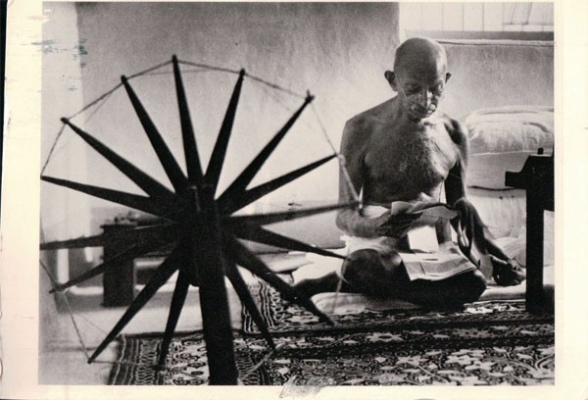
What did Gandhi mean when he is quoted to have said ” Be the change you want to see in the world”?
We Indians call Mahatma Gandhi the ‘Father of the Nation’ because we attribute our gaining of independence from the long British rule to him.
” De di hume azaadi bina khadag bina dhal, Sabarmati ke sant, tune kar diya kamal” is a song most of us must have sung in our school days!
But what did Gandhi really mean by Swaraj & Satyagraha? Did Swaraj just mean ‘home rule’ to him?
On the journey back from South Africa to India, where he had spearheaded a long ‘non co operation movement’ against apartheid (and emerged victorious to a degree) he wrote out the Hind Swaraj in just 10 days. (Travel by sea route in a ship took that long then.) So furious was his speed of writing that he often had to shift from him right hand to his left hand to continue writing.
He wrote out his blue print for Swaraj and what it meant in this treatise.
Gandhi believed that the struggle for freedom must come from within. Only outer and inner Swaraj would make India a strong nation, a model of political change for the whole world.
Individual and nation are not two different entities, he said.
“Emancipate yourself. Even that burden is very great. Apply everything to yourself. Nobility of soul consists in realizing that you are yourself India. In your emancipation lies the emancipation of India. All else is make believe.”
Do not blame the British for ‘ruling over us’. That imputes we have no control over the situation and that they (British) are our masters.
If Indians understand, and acknowledge that they had chosen the British Raj, they could then choose to end it.
He wanted to rouse awareness through Satyagraha that Indians, not the British, were responsible for India’s plight.
This conviction was the reason that he refused to accept violent means in our fight for independence.
“If we accept their very means of fighting them, they will easily overcome us with their brute strength.
He believed that non violence would strengthen Indians because it would create greater unity and make it possible for India and Great Britian to become in the long run, allies instead of enemies. How prophetic were his thoughts!
Actually Gandhi often elaborated, at great length that his fight was not against the British per se, but the modern civilization they stood for. He believed that the modern civilization was irreligious and immoral. It was based on materialism, where Money was God. He would like to believe in the ancient Indian civilization where Love was God.
How very ironic that in today’s India, every city and town has one road named Mahatma Gandhi road, and most of the time this M.G. Road is the commercial hub of that city!
” English were a nation of shop keepers and Money was their God” he often quipped.
The influence of Tolstoy
M. Gandhi himself has said “Three moderns have left a deep impress on my life and captivated me. Raychandbhai by his living contact; Tolstoy by his book, “The Kingdom of God is within you”; and Ruskin by his “Unto This Last”. Besides these three personalities, Mahatma Jyotiba Phule, and the Gita and the Bible were life long sources of inspiration for Gandhi.
He was never swayed by Communism, but he totally rejected the traps of modern civilization and many of its institutes too.
At the core of his philosophy were three thoughts –
The good of the individual is contained in the welfare of all.
All have same right of earning their livelihood from their work.
That a life of labour is the life worth living.
It is a tragedy that most young Indians and even Indian leaders of the present generation, specially of the current Ruling party, misunderstand and misconstrue Gandhi; while the world revers him more as the years go by…
It is worth noting that France is taking the lead in celebrating 150 years of Gandhi in Sewagram today along with India.
If only our leaders, present and future, follow Gandhi’s ideals of renunciation and Service (Sewa) they would understand the significance of ‘Sewagram’ where they are all rushing today to pay lip service to the Mahatma.
And India would be a happier place.
… Sunita Mudaliar Executive Editor













